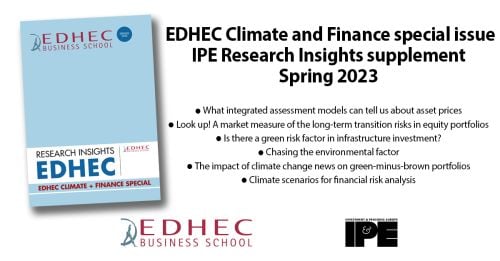
IPE EDHEC CLIMATE & FINANCE RESEARCH INSIGHTS SUPPLEMENT IS OUT
Written on 14 Mar 2023.

EDHEC Business School just published the 1st EDHEC Climate and Finance special issue of the EDHEC Research Insights supplement to Investment & Pensions Europe (IPE)
This supplement, prepared by EDHEC-Risk Climate, EDHECinfra and Scientific Portfolio, aims to provide European institutional investors with an academic research perspective on the most relevant issues in the industry today. It contains articles of particular relevance to asset owners:
In the first article we describe how the oft-criticised models linking the economy and the planet’s climate can be upgraded to include the latest advances of science. We present original simulation work showing that targeting 1.5–2°C of warming can be justified as an optimal goal from an economic standpoint. We also show that while the emissions abatement pace implied by such an objective is technically possible, it is improbable and should not be considered a ‘central’ scenario.
In the second article, the core team of Scientific Portfolio describe how they developed a factor that captures both the sectoral and intra-sectoral dimensions of transition risks. The authors find that, while their factor is forward looking, it efficiently identifies funds considered as ‘green’ or ‘brown’. They also discuss how their approach enables the management of transition risks to be seamlessly integrated into portfolio construction.
In the third article EDHECInfra analyses the outperformance of low-carbon energy infrastructure investments over the past decade and find that it is largely explained by excess demand. After controlling for risk factors, they find no persistent ‘green’ risk factor, but instead a ‘green price premium’ that investors have been willing to pay
In the fourth article, we use advanced econometric methods to explore the relationship between stock returns and proxies for environmental footprint. We identify a latent environmental factor with significant explanatory power in the energy sector and find that emissions-related metrics are the main drivers of stocks’ exposure to this factor.
In the penultimate article of this special issue, we use a variety of language models to construct climate news indices. We find that returns of high carbon intensity portfolios show a strongly statistically significant negative association with a climate-news index constructed from the aggregation of sources. This research benefits from the support of Amundi.
Corporates and investors are increasingly expected, if not legally required, to assess their climate-related financial risks using climate scenarios. In the closing article we introduce and discuss the characteristics of long-term climate scenarios, such as those developed by the Network of Central Banks and Supervisors for Greening the Financial System (NGFS), we look at their operationalisation for climate-financial risk assessment, their current limitations and their potential for further development.
The first issue of the EDHEC Climate and Finance Research Insights supplement to IPE proposes the following articles:
- What integrated assessment models can tell us about asset prices, by Riccardo Rebonato, EDHEC-Risk Climate Scientific Director
- Look up! A market measure of the long-term transition risks in equity portfolios, by Head of Research Benoit Vaucher, PhD, CFA, ESG Director Vincent Bouchet, PhD, and Director Benjamin Herzog
- Is there a ‘green’ risk factor in infrastructure investment?, by EDHEC-Risk Climate Affiliate Member Professor Noël Amenc and EDHECinfra Director Frédéric Blanc-Brude, PhD
- Chasing the environmental factor, by EDHEC-Risk Climate Research Engineer Emanuele Chini
- The impact of climate change news on green-minus-brown portfolios, by EDHEC-Risk Climate Research Director Professor Dominic O’Kane and Senior Research Engineer Jean-Michel Maeso, PhD
- Climate scenarios for financial risk analysis, by EDHEC-Risk Climate Research Programme Director and climate-stress testing pioneer Professor Irene Monasterolo. Professor Monasterolo
Related link:

